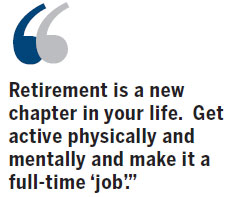It's a full-time job to be a happy retiree
Updated: 2014-04-11 04:56
By ALbert Lin(HK Edition)
|
|||||||||

To make your retirement a success it takes a full-time job; that, of course, is an oxymoron. But I can explain.
If you're one of a large number of older people who will soon be confronted by the retirement bogeyman, here's some good news to soften the coming blow. You won't have to face a future sitting in a rocking chair watching TV, stuffing down nibbles and putting on weight. Your saviour is the Internet.
Used properly, the Internet is both your "receiving station" for an inflow of interesting information and your personal encyclopedia.
Yes, modern technology is there - literally at your fingertips - to rescue you from boredom.
Some of my friends who retired in recent years tell me that, instead of being bored stiff and sitting at home twiddling their thumbs, they have added a new and highly enjoyable dimension to their lives - using the Internet and swapping all sorts of interesting e-mails.
"While busy at my job I never had the time or inclination to read any of that stuff - it was all work, work, work," said one retiree who played a key role in Hong Kong's logistics industry for 25 years.
"Quite honestly I was a victim of the retirement bogeyman - all those stories you hear about livewire makers and shakers given a golden handshake and put out to pasture like a tired old racehorse from the Jockey Club."
Thanks to the office routines and tidy habits he employed at his workplace he has set up what he terms his "cubbyhole office" in his Kowloon Tong flat, and has a filing system for important messages. He makes print-outs of them all before hitting the delete button. Already his file on medical and health advice is bulging, specially the section containing tips on how to prevent Alzheimer's disease and dementia.

And might I add that by keeping his brain active while reading - and digesting - his daily inflow of informative e-mails, he is actually keeping the dreaded Alzheimer's at bay - because it affects the least mentally active.
Another retiree friend who dreaded the likelihood of years of idleness has also taken a new lease on life thanks to his new-found addiction to the keyboard. He, too, feared a "hard landing" after filling a senior post with a respected bank. From his plush office in Central he was involved in highly important financial transactions, with some efficient staff to do his bidding.
Because his family originated from Shandong he has developed a great interest in its history, particularly Shandong's most illustrious son, Confucius. As he points out, although the sage's advice might be 2,500 years old, it is just as applicable to today's world as it was when he first spoke his words of wisdom.
The ex-banker has found that there are a surprisingly large number of people who admire Confucius - not just in China but spread around the globe. Many of them are non-Chinese and eager to swap handed-down wisdom for the modern age.
So how does an "outsider" enter the magic circle of intelligent retirees who take pleasure in receiving, reading and then passing on to their circle of friends all these interesting messages about everything from the Great Wall and electric-powered vehicles to the space race and the meditations of Buddhist masters?
The rules are there are no rules the next time you receive an out-of-the-ordinary message, send a thank-you to the sender, tell him or her how much you appreciated the message, and ask for all future interesting messages to be passed to you. And in turn, when you pass on such messages to your circle of addressees, ask them, too, to be on the lookout for such messages, which you would greatly appreciate receiving.
And gradually the drip-feed of yesteryear will become a mini-avalanche.
Meanwhile, if you are a recent retiree and are looking for other things to do besides sitting at your computer, here are some useful ideas to fight off the "retirement bogeyman".
1. Retirement is a new chapter in your life. Get active physically and mentally and make it a full-time "job".
2. Don't become a recluse glued to a TV set, disregarding exercise and putting on the kilos.
3. Take up different interests and hobbies. Reading is fine but don't become a book worm.
4. Consider getting involved in charitable activities - not simply by sending a cheque regularly to a good cause, but by physically helping people in need.
5. You probably belong to at least one club. They are always looking for interesting speakers for their monthly luncheon. Consider giving a speech on, say, the pitfalls for the unwary in your former profession.
6. Consider other ways in which you can become a do-gooder by applying or adapting the invaluable knowledge you gained during your successful career.
The author is the op-ed editor of China Daily Hong Kong Edition.
albertlin@chinadailyhk.com
(HK Edition 04/11/2014 page9)